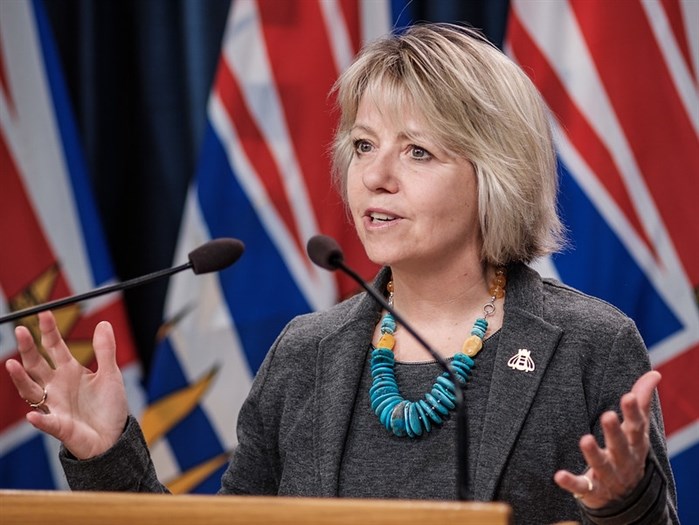
Provincial Health Officer Dr. Bonnie Henry
Image Credit: Province of British Columbia
April 17, 2020 - 4:30 PM
No matter how obedient British Columbians are about safe distancing and other anti-COVID-19 measures, the death toll from the disease will continue to climb – for awhile at least.
“We’re at the point in our pandemic, right now, where there are people who are sick with this disease or have been exposed and it takes three to six weeks to know whether people are going to recover completely or whether they may succumb to this illness,” provincial health officer Dr. Bonnie Henry said. “We are, unfortunately, going to see more deaths in the future.”
Henry made the comments during a media briefing today, April 17, while showing models that attempt to predict the course of the pandemic.
B.C. reported 14 new cases of COVID-19 today for a total of 1,575 cases and 78 deaths. There are now 150 cases in the Interior Health region, an increase of one. There were no new deaths in B.C. but the outbreak at the federal prison in Mission grew to 63 cases, six of whom are in hospital.
Henry pointed out that social distancing, self-isolating and frequent hand washing worked well to keep the disease from spreading dramatically and overwhelming hospitals but that those measures will have to continue for weeks and months to come.
The provincial modelling figures are not a sign of so-called herd immunity in B.C., but Henry said there is the potential over time to lift some of the restrictions imposed because of the pandemic.
Health Minister Adrian Dix said the way forward is finding a new, healthy normal that does not undermine the social fabric or the economy.
"It's bad for our health not to have school classes going," he said. "It's bad for our health when people are unemployed. It's bad for our health when the surgeries are cancelled. It's bad for our health that we can't visit our loved ones in long-term care."
But Dix said people should take solace in the decisions that have been made to fight COVID-19 and the progress shown.
"We can't go back to last December right now, so together what we have to do is we have to use our strengths to find a middle road," he said.
The data made it clear the virus has been particularly hard on the elderly — especially those over the age of 80 — who are disproportionately more likely to die.
Only three of the 72 people who died up until April 14 were under the age of 70 and most of those were over 80.
The median age for those who tested positive for COVID-19 was 54, ranging from an infant to someone who was 102-years-old.
When it comes to those who needed to be hospitalized, the median age jumped to 68 while the median age of those who died leapt to 86. That’s due, in part, to the fact that there have been serious outbreaks in a couple of long term care homes in the Lower Mainland.
The data also shows that the younger the patient, the less likely it is that they will need to go to hospital or die.
— With files from The Canadian Press
To contact a reporter for this story, email Rob Munro or call 250-808-0143 or email the editor. You can also submit photos, videos or news tips to the newsroom and be entered to win a monthly prize draw.
We welcome your comments and opinions on our stories but play nice. We won't censor or delete comments unless they contain off-topic statements or links, unnecessary vulgarity, false facts, spam or obviously fake profiles. If you have any concerns about what you see in comments, email the editor in the link above.
News from © iNFOnews, 2020